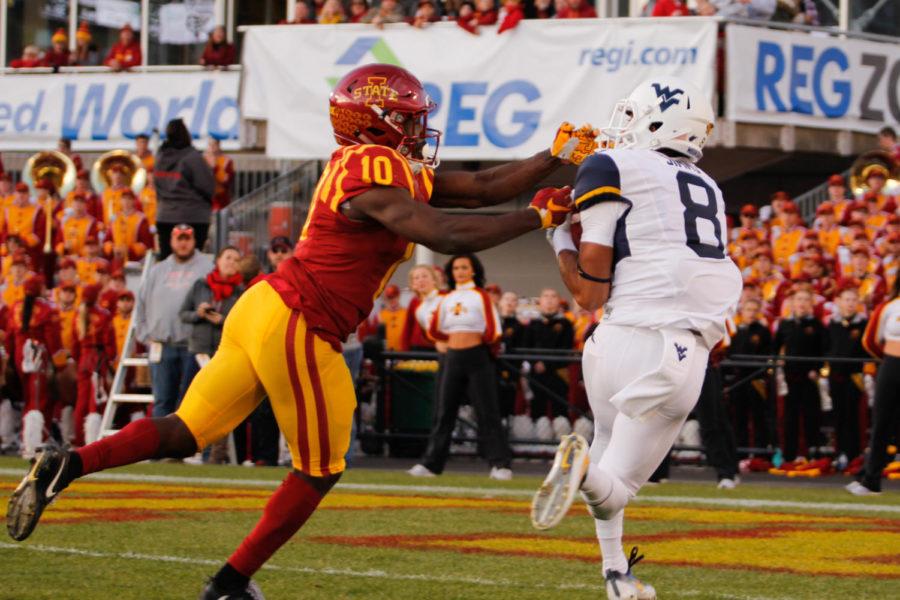A restriction on the First Amendment in the college sports world
April 11, 2018
It took a simple kneel for the First Amendment discussion to become one of the biggest discussions in sports for the past couple of years.
Former San Francisco 49ers quarterback, Colin Kaepernick, did not stand for the “Star-Spangled Banner” on August 14, 2016, in the 49ers’ first preseason game against the Houston Texans. He performed this action on Aug. 14 and then again on Aug. 20 without anyone really noticing.
Then, Kaepernick received the nod to start the third preseason game and all eyes were on him throughout the pregame. That led to the national anthem as Kaepernick sat on the bench during the song and a week later (on Sep. 5) he started kneeling.
The actions from Kaepernick have led to a back-and-forth discussion between athletes from every sport and U.S. citizens. The discussion has continued to be brought up and it’s 2018, but it’s a prime example of First Amendment rights.
It’s not against any NFL rule to kneel during the “Star-Spangled Banner,” but it’s recommended to stand. This action of kneeling brought discussions throughout college sports, too.
Even though college football doesn’t have the teams out on the field during the national anthem, there’s been discussions about the First Amendment and how not only college football, but every college sport utilizes the First Amendment in their daily lives.
“I mean we are in a fish tank and [us athletes are] looked upon to make all these, I guess, political decisions when deep down there’s some things we would like to voice our opinion on,” said redshirt senior defensive back Brian Peavy. “With me being open-minded as I am, sometimes I got to rethink about things like should I tweet this or should I say this. I definitely feel like it’s a restriction.”
The First Amendment states that “Congress shall make no law respecting an establishment of religion, or prohibiting the free exercise thereof; or abridging the freedom of speech, or of the press; or the right of the people peaceably to assemble, and to petition the Government for a redress of grievances.”
Peavy said he’s had to rethink some Twitter posts and other opinions because he knows it would reflect poorly on Iowa State football and the athletics department. With him being one of the big faces on the team this upcoming season, he’s a role model to many children and young football players and he wants to make sure these people can look up to him.
The redshirt senior defensive back isn’t the only one that feels this pressure as an athlete. Senior outside hitter Jess Schaben also feels restricted on what she can and cannot say on social media or in public because of the spotlight on her as an athlete.
“Just being in the spotlight, you don’t want to post anything that’s unprofessional or could be controversial,” Schaben said. “You want little kids to look up to you. Even when you’re getting a job, you want people to respect you. I think it’s good to keep it professional.”
Due to the amount of spotlight an athlete receives, some players choose to shut down or freeze their social media accounts so they can focus on the season. And it’s not just athletes that wrestling the utilization of the First Amendment.
There are coaches that deal with these problems on a daily basis. The question of what to say and what not to say or how to handle a situation of a player on their team. Coaches like Iowa State volleyball coach Christy Johnson-Lynch has views on this particular topic centered around the First Amendment.
“For me personally, I approach it as I think my personal life and my personal views are separate from my professional life, so I keep them very separate,” Johnson-Lynch said.
It can be hard for an athlete or coach to show their true feelings on any matter because they know the spotlight is on them 24/7 and one wrong move or one bad tweet could lead them down a road of negativity from the public.
“For guys that may not know how to bite their tongues on certain things, they could get into a lot of trouble or it could be frowned upon for decisions that are in the First Amendment, which they should be able to say what they want to say,” Peavy said.
There needs to be a balance in the sports world and that comes with making smart decisions when out in public and when posting statuses on social media. Johnson-Lynch said the hardest thing about social media is that you can’t take it back because it’s out there forever, so using common sense and being smart as an athlete and as a human being is the biggest step.
“I’ve always felt like some of those views are just more appropriate for your friends, your family, people that are close to you that know you,” Johnson-Lynch said. “I don’t think the whole world needs to know what I think about certain things.”
Brian Mozey, Noah Rohlfing and Spencer Suckow contributed reporting to this story.
















